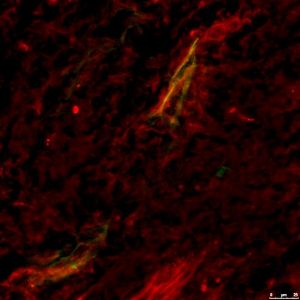Reversing the characteristic alterations in the blood vessels that supply malignant tumours could increase the effectiveness of anticancer treatments. A study published in Nature Communications proposes that SOD3, an essential protein in reducing vascular permeability, could be a good target for this type of therapeutic strategy.
"We have seen that treatments that increase SOD3 expression in the tumour microenvironment can normalize blood vessel activity and improve the effectiveness of therapies already being used in patients," explains Santos Mañes, a scientist at the Centro Nacional de Biotecnología of the CSIC (CNB-CSIC) and director of the research. "The most interesting thing is that certain drugs already being applied for humans, such as lovastatin, can increase SOD3 levels in tumors, at least in mice," he adds.
The study, led by CNB-CSIC scientists, is part of a research project awarded by the Domingo Martínez Foundation in 2015. The work also involved researchers from the Hospital Clínico San Carlos in Madrid, the Instituto de Química Avanzada de Cataluña (IQAC; Barcelona), the Centro Nacional de Investigaciones Cardiovasculares Carlos III (CNIC; Madrid) and the University of Pittsburgh (Pennsylvania, USA).
Normalizing circulation to enable the drug to reach its destination
Malignant cancers are characterized by stimulating formation of new blood vessels through a process termed angiogenesis. These new vessels are usually aberrant, which leads to inadequate circulation and keeps drugs from reaching the tumour cells. Normalizing the function of these blood vessels is therefore a good strategy for helping drugs reach their destination and increasing treatment effectiveness.
In some cases, this normalization can be achieved with antiangiogenic drugs, although their clinical benefit is limited, as long-term use eliminates blood vessels and prevents the substances from reaching the malignant cells. According to the authors of the study, it is therefore essential to identify new elements that regulate blood vessel normalization without eliminating them.
The scientists observed that increasing SOD3 expression in the tumour microenvironment decreases blood vessel permeability. "The decrease in vascular permeability reduces the interstitial pressure in the tumour tissue," says Mañes. “This promotes the exchange of gasses and other substances between the bloodstream and the tumour." For this reason, the SOD3 increase in tumours implanted in mice also increased intratumoural levels of the drug, and the response of the mice to therapy improved significantly.
- Emilia Mira, Lorena Carmona-Rodríguez, Beatriz Pérez-Villamil, Josefina Casas, María J. Fernández-Aceñero, Diego Martínez-Rey, Paula Martín-González, Ignacio Heras-Murillo, Mateo Paz-Cabezas, Manuel Tardáguila, Tim D. Oury, Silvia Martínez-Puig, Rosa A. Lacalle, Gemma Fabriás, Eduardo Díaz-Rubio, Santos Mañes. SOD3 improves the tumor response to chemotherapy by stabilizing endotelial HIF-2a. Nature Communications 2018 DOI: 10.1038/s41467-018-03079-1






